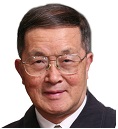President Xi Jinping travelled abroad from September 3rd to the 13th. He attended the G20 summit in St. Petersburg, met other BRICS leaders between the sessions, visited four Central Asian countries and went to the summit of Shanghai Cooperation Organization (SCO). These activities all have something to do with the US and Russia but none is directed against either of them. This has given me some food for thought on the China-US-Russia triangular relationship.
The three countries played their own unique roles at the St. Petersburg summit themed growth and employment. Though not appearing rich and imposing, Russia played the lead role as the host country. The summit, to a certain extent, became a forum for China to advocate its diplomacy, offer its solutions and convey its sense of confidence. Some media claimed that China had led in pushing the global economy towards more balanced and sustainable growth. Implicated by the Syrian question, the US was questioned by many countries present at the summit and was almost also a “star” in a passive situation.
Some points made by Xi during this trip have caused special attention.
In his speech at Nazarbayev University, Kazakhstan, on Septemeber 7th, Xi said that China would not “seek to dominate regional affairs or establish a sphere of influence.” This is a solemn commitment to the international community undertaken by China seeking a path to peaceful development and a statement for the ears of Russia, another SCO member, and the US, who covets Central Asia. There are always outsiders who are suspicious about or motivated by a desire to see China-Russia contest over domination within SCO. Actually the SCO members play quite complementary roles. For example, in the security field, Russia plays a more outstanding role because of historical traditions, geopolitical factors and national strength. In the economic field, the Chinese role is more obvious given the different economic situations in member states. Only when all countries endeavor to do what they are respectively good at can they really “continue strengthening cooperation within the framework of this organization and enhancing it to a brand new level with a view to building the region of Shanghai Cooperation Organization into a harmonious region of lasting peace, friendship and prosperity” as announced in the Bishkek Statement.
Xi’s visit to the four Central Asian countries marked the upgrading of Chinese relationship with these countries to strategic partnership or comprehensive strategic partnership. These relationships are envisioned as being comprehensive, long-term and multidimensional and based on the Shanghai Spirit. The conduct is not directed against Russia. Rather, it draws upon the experiences of the comprehensive strategic partnership of coordination with Russia that has already been in place. Neither, is it targeted against the US. As early as in 1997, leaders of China and the US jointly envisioned and announced their intention to construct a strategic partnership oriented towards the 21st century, a vision later stranded not for reasons on the part of China. After President Barack Obama took office, the two sides started to talk about a positive, cooperative and comprehensive relationship. More recently, the two sides have agreed to create a new type of great power relationship, the meaning of which seems quite similar to strategic partnership.
The interaction among China, US and Russia is no secret and has been rather subtle. With the world’s largest developed capitalist country, largest socialist developing country and largest transition economy, the triangular relationship has an enormous bearing on global peace, stability and development. Any set of bilateral interaction, if being less than sound, may bring with it regional or even world disability. Neither China-Russia relations nor China-US relations are dependent on the state of US-Russia relations, and vice versa. The profound structural contradiction between Russia and the US comes from their vastly different strategies. Actually Russia demands only one thing from the US, i.e., the latter should not obstruct its returning to great power status. This sort of relationship often features the expediency of sudden warming up, the necessity of frequent cooling down and the relativity between warmth and coldness.
America’s external relations and international situation today deserve much research. When Chinese people talked about changing fortune, it’s linked to the diversion of Yellow River’s watercourse every thirty years. For the US since the end of the Cold War, every decade has been different. In the first ten years after Soviet disintegration, the US focused on digesting and expanding the fruits of Soviet disintegration, which was smooth and easy. The second decade since start of the new century witnessed a series of impacts such as the 911 incident, Iraq War and financial crisis, leading the US into a more embarrassing situation. What will its third decade be like? Many predicted that the US would not be as at ease as before. In 1999, the Kosovo was fought by NATO. When the Iraq War was launched in 2003, the US saw “old” and “new” Europe over differences within NATO. And this time NATO simply does not want to get involved in attacking Syria. The US seems not to have changed its mindset of world domination, but its own strength and external conditions have evolved. However, there is no denying that the US remains the world’s sole superpower today. It is still regional hotspots under the influence of American policies that lead to complicated and changing international situations. And it is still great power relationships centering on the US that to a large extent shape world security environment.
Yu Sui is a professor with the China Center for Contemporary World Studies.
